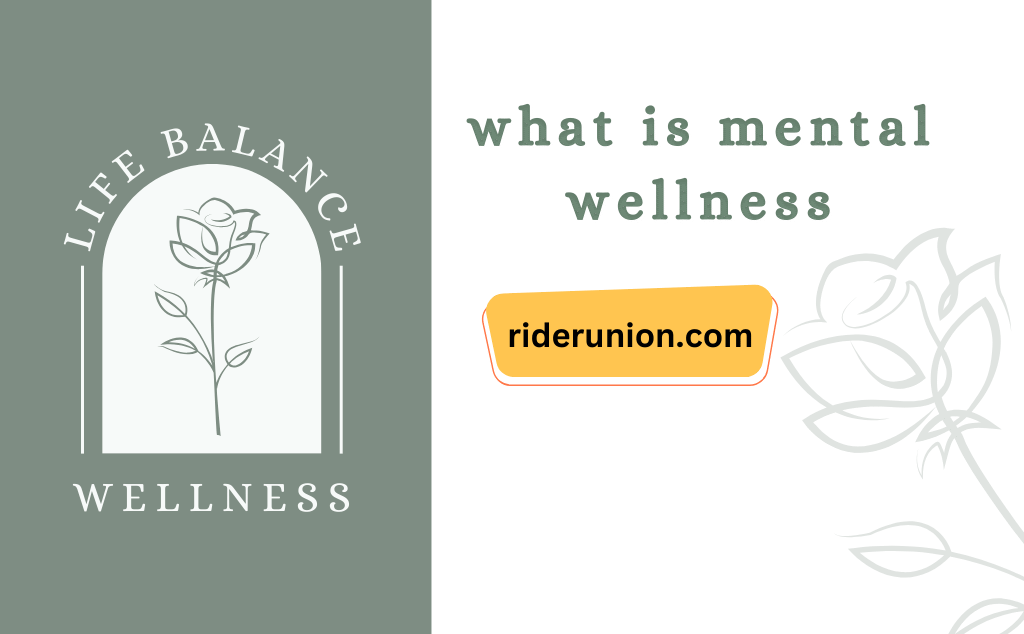When you hear the terms "what is mental wellness," you may imagine they mean a condition of constant enjoyment. But it is more than that. The human body, brain, and lifestyle must engage in a complex dance that accommodates a wide range of emotions. Instead of being continuously joyful, the key to mental health is to navigate these many life events and emotions with a feeling of balance.
Continue reading to learn what mental wellbeing looks like and how you may enhance it in your own life.
What is mental wellness?
The World Health Organization defines mental wellbeing as "a state of well-being in which the individual realizes his or her own abilities, can cope with normal stresses, works productively, and contributes to his or her community."
This definition excludes happiness from its scope. It is also not characterized as being free of mental disorders.
Rather, mental wellbeing refers to your ability to deal appropriately with the demands of life, whether they are as basic as a job assignment or as complex as a divorce.
It is the equilibrium of your emotional, bodily, spiritual, and mental selves.
How can I improve my mental health?
Not sure whether you passed the mental health test? Ongoing symptoms may indicate a larger issue.
- Excessive or insufficient eating or sleeping, as well as withdrawal from social interactions and activities.
- Having little or no energy
- Feeling numb, as if nothing mattered
- Have unexplainable aches and pains.
- Feeling helpless and hopeless
- Excessive smoking, drinking, or drug use
- Feeling especially anxious, furious, agitated, frightened, or afraid
- yelling or arguing with your relatives and friends.
- Having significant mood swings.
- Thinking of hurting oneself or others
- Inability to do everyday duties.
If you or a loved one are experiencing one or more of these symptoms, it may be time to concentrate on improving your mental health. Improving mental wellbeing may take various forms for different people, but there are some general recommendations to follow if you want to work on it. This includes:
- Allow yourself to seek expert assistance if needed.
- Staying in touch with friends, family, and the community
- Finding strategies to maintain a cheerful mindset.
- Integrating physical activity into your schedule
- Volunteering or assisting others.
- Developing coping strategies that are appropriate for you
How Can You Improve Your Mental Health?
The key to improving mental health is to concentrate on various aspects of your life, one at a time. For example, one week might be dedicated to activities like yoga, mindfulness, and meditation, which can help you live "in the moment." This entails letting go of past and future concerns in favor of focusing only on the present.
The following week may be dedicated to rest and leisure. Though being busy is great, make sure you take pauses and aren't too harsh on yourself. Lack of rest, both physical and mental, may result in burnout and harmful coping techniques.
Another week may be spent prioritizing time with loved ones. This is an excellent technique to improve mental wellness. A day spent with your closest friend or family may help you deal with trauma, boost your self-esteem, and improve your mood.
5 Activities to Improve Mental Health
There are certain activities you can engage in to improve your mental health and balance your mental, physical, spiritual, and emotional selves. Here are five to get you started:
1. Feed your brain: When life becomes chaotic, it's tempting to prioritize your personal demands for a job, social life, or other responsibilities. However, your nutritional health is crucial. Find out which meals make you feel the best and stick to them.
2. Get your blood pumping: Exercise produces endorphins, the 'feel good' chemical, to flood your brain while also lowering cortisol, the stress hormone. Try to obtain at least 15 minutes of exercise each day.
3. Plan your sleep routine and stick to it. Most individuals need 7-9 hours of sleep. If you have difficulties sleeping, it may be beneficial to establish morning and nightly sleep rituals, such as stretching, writing, bathing, reading, or any other activity that helps you wind down at night and wake up in the morning.
4. Perform an activity in which you excel: Are you an incredible painter? Focused musician? Fast runner? Get that surge of adrenaline that comes from knowing you're doing something well. Don't you know what you're excellent at yet? Even great. Explore a variety of interests and passions until you discover one that appeals to you.
5. Ask for help when you need it. Whatever you're going through, large or small, you're not alone. Don't feel obligated to be tough and push through your concerns; instead, make sure you have a solid support network or a healthcare expert with whom you can discuss them.
Mental wellness promotes overall wellness.
While there is no one-size-fits-all solution to mental health and wellbeing, you may use a variety of tools and tactics. Not all of them will work for you, but attempting a variety of strategies can help you discover your own secret recipe for success.
Working Towards Mental Wellness
There are several strategies to improve your mood, create resilience, and get more pleasure out of life.
- Learn to be at peace with yourself.
- Discover who you are and what makes you happy.
- Identify what you can and cannot alter about yourself.
- Identify your strengths and limitations, accept them, improve on them, and make the most of what you have.
- Pay attention to your wants and emotions.
- Express your views in a diary or blog to learn more about yourself.
- Work towards your ambitions.
- Set SMART objectives (specific, measurable, achievable, relevant, and time-limited).
- Maintain a healthy lifestyle.
- Take balanced meals.
- Exercise frequently and limit alcohol intake.
- Avoid using cigarettes and other dangerous chemicals.
- Create strong connections.
- Make time for family and friends, and share your joys and sorrows with them.
- Prepare a financial budget.
- Avoid overpaying and concentrate on 'needs' rather than 'wants'.
- Volunteer for a cause.
- Participating in the community brings a feeling of purpose and happiness.
FAQ's
What is the definition of mental wellness?
Mental wellness acknowledges the interconnectedness and holistic nature of our health and wellbeing. Our mental mood has an impact on our physical health, and vice versa. When our circumstances change, we may need to adopt new routines or tactics to manage stress, build resilience, and cope with adversity.
What are the five concepts of mental wellness?
The Five Essential Concepts to Direct Your Journey to Well-Being in the Wellness Recovery Action Plan! provides questions and self-reflections based on the five WRAP-key concepts: education, support, self-advocacy, hope, and personal responsibility.
How do you define mental wellbeing?
Mental health is a condition of mental well-being that allows individuals to deal with life's challenges, develop their potential, study and work effectively, and contribute to their society.
What are the four types of mental health?
Mood problems (such as sadness or bipolar disorder). Anxiety disorders. Personality disorders. psychotic diseases (including schizophrenia)







